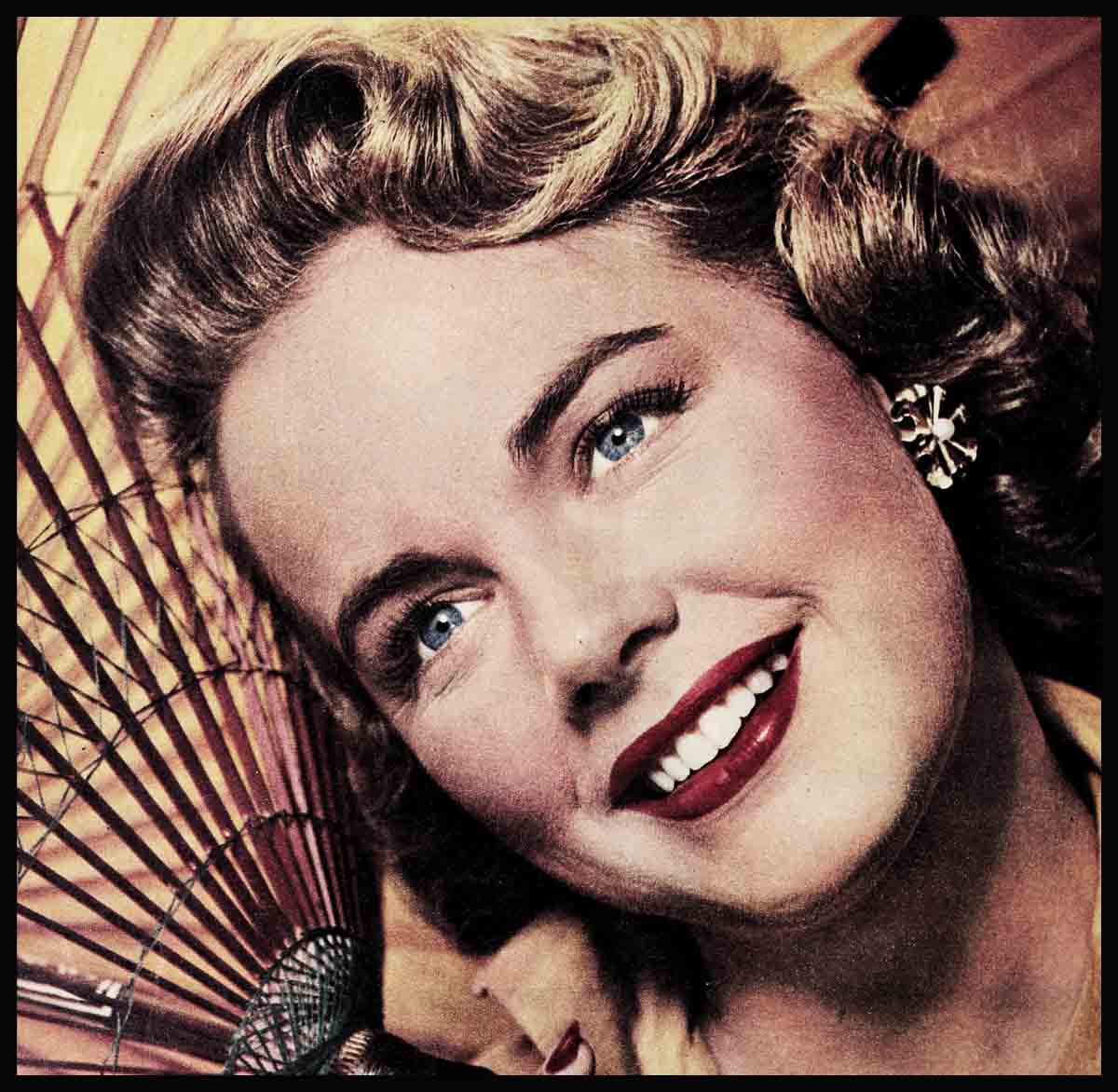
It’s Fun To Be Thin Says Terry Moore
I’m a girl who likes to eat heartily—out of sheer love of good food. And I’ve always been very active. But there comes a time in every young girl’s life when she finds she’s managed to consume more calories than her body has been able to burn. My time arrived. One evening I looked into the mirror and made a decision. “My figure could stand some streamlining,” I sighed. “A couple dozen pounds worth, I think.”
The statement startled my mother. “Five pounds will do nicely,” she said. “Your father and I will tolerate no malnutrition cases around this house.”
“But I’d like to be able to sort of slither around,” I teased. “Sophisticated siren-like.”
“We’ll tolerate no sophisticated sirens either,” she declared. “Just several pounds less of Terry Moore, if you’re really serious about slimming down.”
I was. A few pounds make a big difference with me. And I’ve found that this is true of any motion-picture actress. Keeping in trim is a must in this profession as the camera records each extra ounce and discerning fans with their eyes upon the CinemaScope screen are quick to note overweight.
I’d been off-screen for a number of months and had my heart set on a role in one of 20th’s finest new productions, “Daddy Long Legs.” Naturally I wanted to be in perfect shape so I would be ready if I were lucky enough to get the role.
So after a conference with my doctor, I set out to lose eight pounds (and I might add—got the part and joined Fred Astaire and Leslie Caron in the cast).
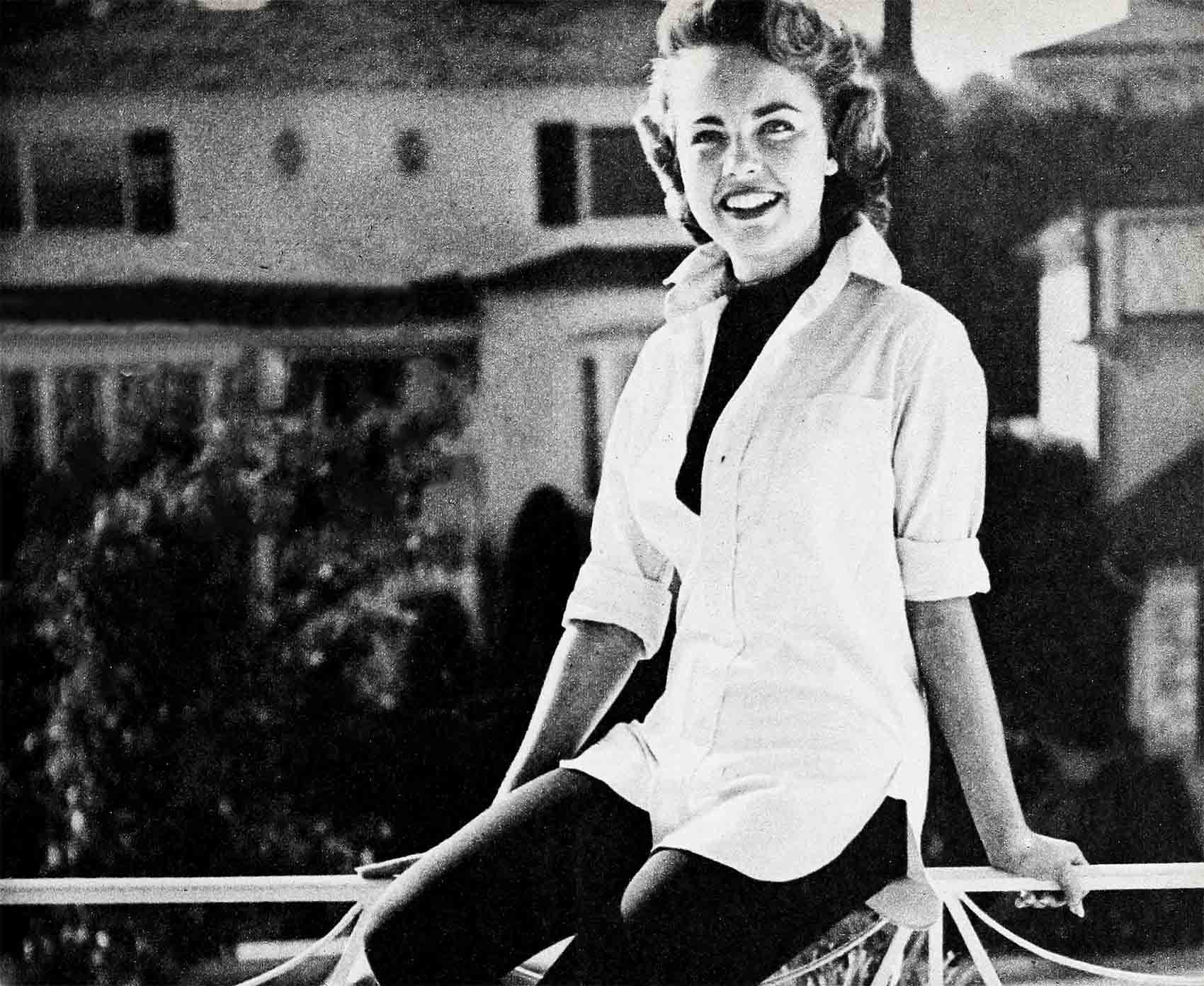
If you’ve ever tried dieting—and what girl hasn’t?—you’ll know there’s work involved. Work and will power. But the rewards are worth it and the advantages of being slim are many. For one, a slender figure gives you a much smarter appearance. You can feel the difference in you—and a difference in others. The very first compliment you receive on your new figure seems to make all those days of calorie-counting worthwhile. I’ve also noticed that a new figure leads to a new interest in other things like your clothes, your hair-do, your fingernails. Automatically, also, you find you’re being neater about yourself. You also find that your clothes budget is stretching farther, since a slim girl can wear far less expensive clothes than her heavier sisters and look twice as chic, too.

But in addition to the psychological uplift, a trim figure brings other important advantages. You are not only prettier, but healthier. In fact, science has proved that excess poundage can actually shorten life. Studies made by insurance companies strongly point up that overweight people die younger.
Doctors will tell you, too, that excessive overweight can be the reason behind your skin irritations, headaches, indigestion, your always-tired feeling. All good reasons for moderation in eating habits, aren’t they?
And despite the old saying that it’s the stout person who’s jolly and happy, today we’re told this is not true. In fact, overeating, which is the main cause of overweight, usually signifies some personal problems.
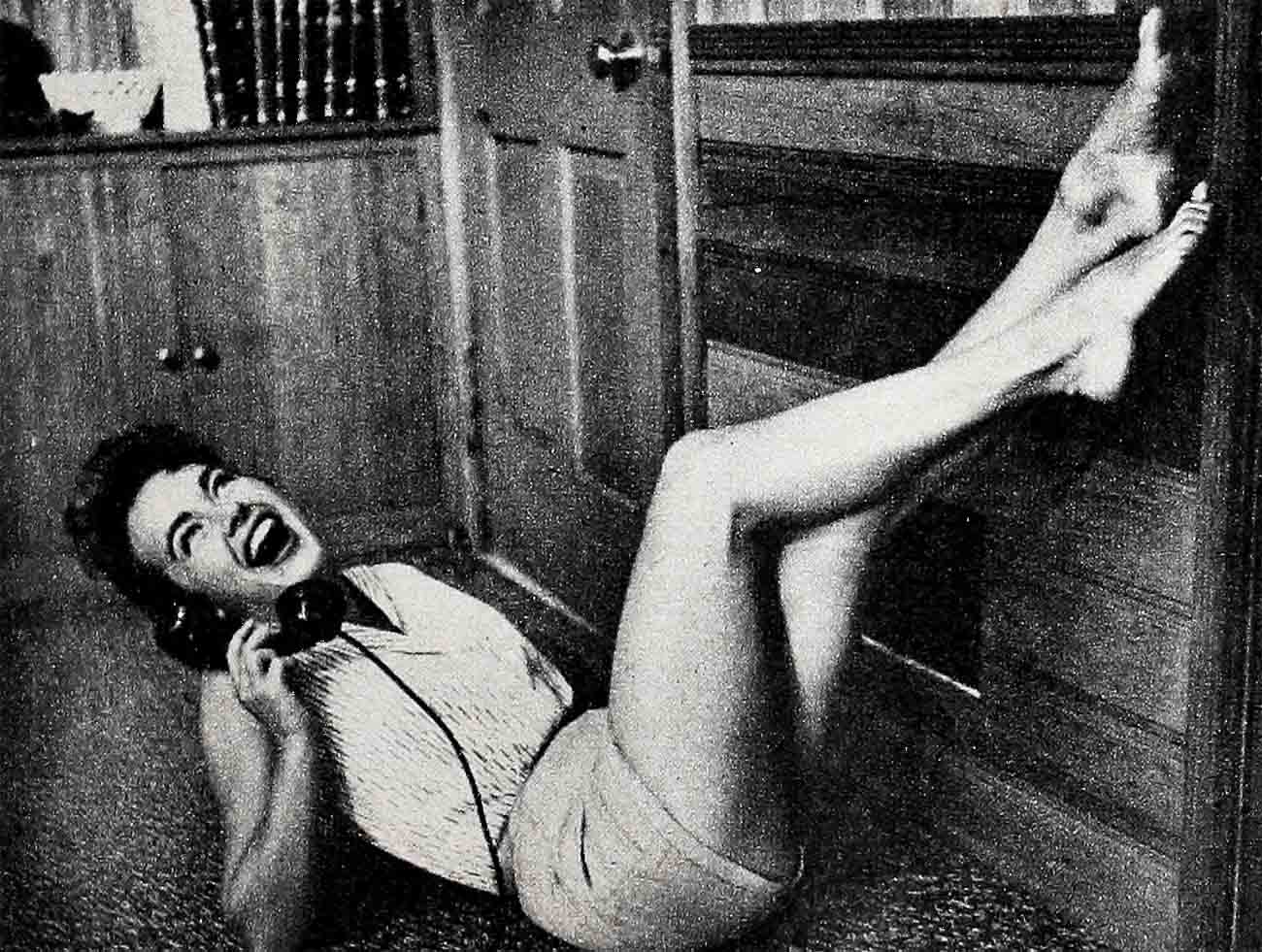
“Eating is the one thing which gives me pleasure,” some folks seem to believe. “Why should I stop?”
Why? indeed! Why not? I say. Why not find a way of life that will enable you to eat to live, rather than living to eat? Let’s face it. If you’re overeating, chances are that you are simply over-indulging yourself, and quite unnecessarily so.
There are other things to do in this world of ours. You’re already busy? Possibly not as busy as you think. Or perhaps boredom has set in and it’s time for a change in your activities. Time to look for new interests, a new hobby, a new job.

If generalizations on the pleasures of being slender aren’t enough for you, find yourself a goal, a specific one which successful dieting will help you attain—like trying to slim down for the beach this summer.
I’m not saying that a smaller intake of calories will bring a greater number of proposals. But who can deny that the project would be of great help? So why not help yourself?
You’re convinced? But how to begin? Sensibly is the key word. First thing, consult your family doctor, or perhaps your school doctor or nurse as to your general health. If you’ve discovered a diet that seems good to you, better discuss it with one of them. For a few changes may have to be made in order to make it suitable for you. Your doctor will tell you how much weight you can afford to lose—safely. (Is there any reason to stress that you should follow his advice very carefully?
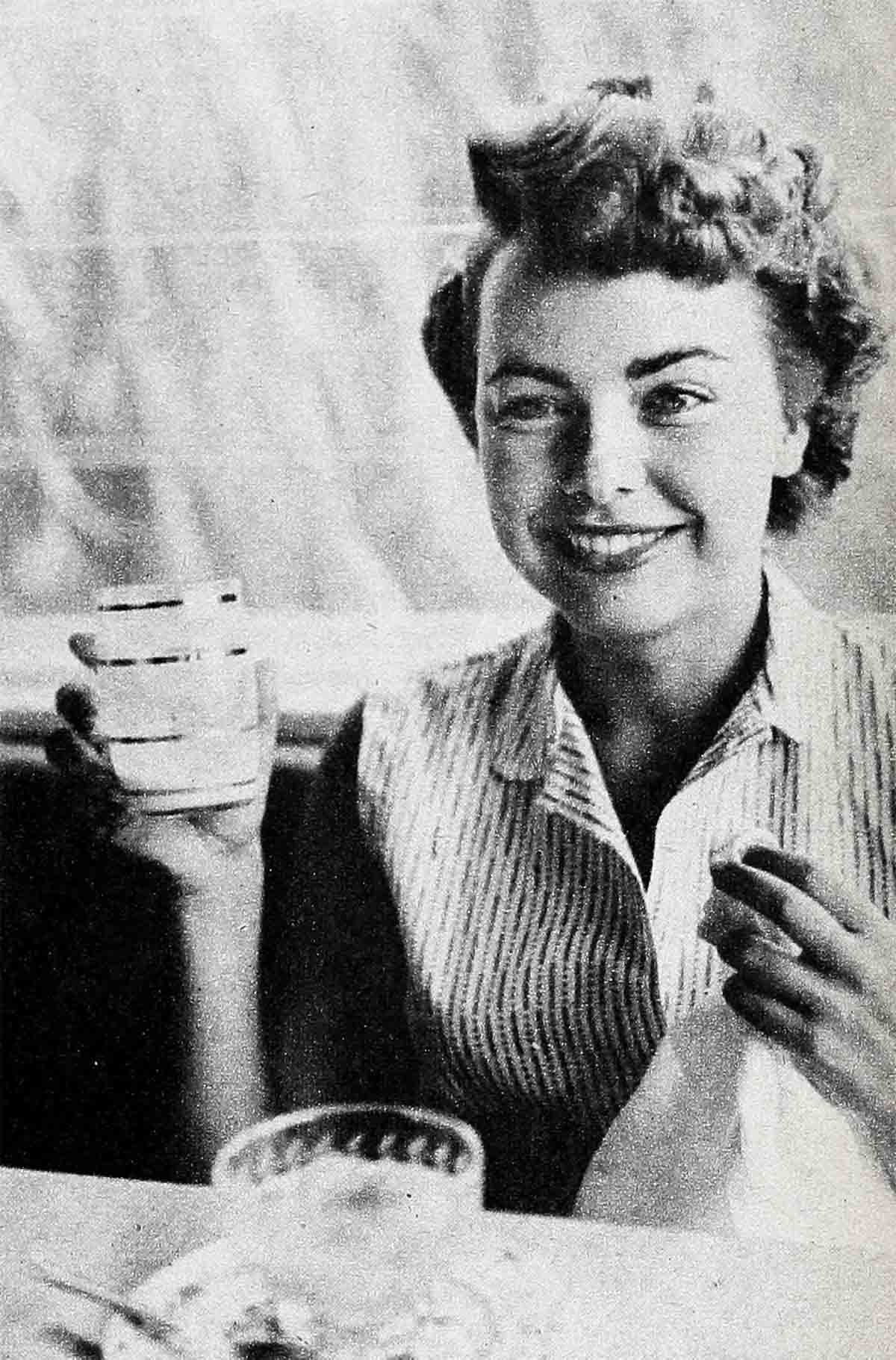
A good thing to remember about weight is that it’s an individual matter. Perhaps you’ve envied the wasplike waist of that popular girl in your English class. After all, you say, you’re both about the same height, and if you could just whittle down to her proportions everything would be dandy—you think. But this isn’t true. The weight—or lack of weight—that looks so good on someone else may not be best for you at all. Face up, you may never have a waistline like the girl in English II. She may have a small body frame; yours may be larger; again, your doctor, knowing you, may think you’ll feel lots better and look nicer with just a few more pounds.
In most cases, overweight is simply a problem of too much to eat and too little exercise. The number of so-called miracle weight reducers around these days are many (you know the kind that promises, “You, too, can take off ten pounds in a week or less”). If you’ve been seriously considering one of them, better ask your doctor about it when you see him. For the best way of losing weight is still the old-fashioned method of less food and regular exercising. Probably ten pounds a week is much too much weight for you to drop. If you can lose from one-half to two pounds a week, you’re doing splendidly, for a moderate steady loss is better than a big quick one.
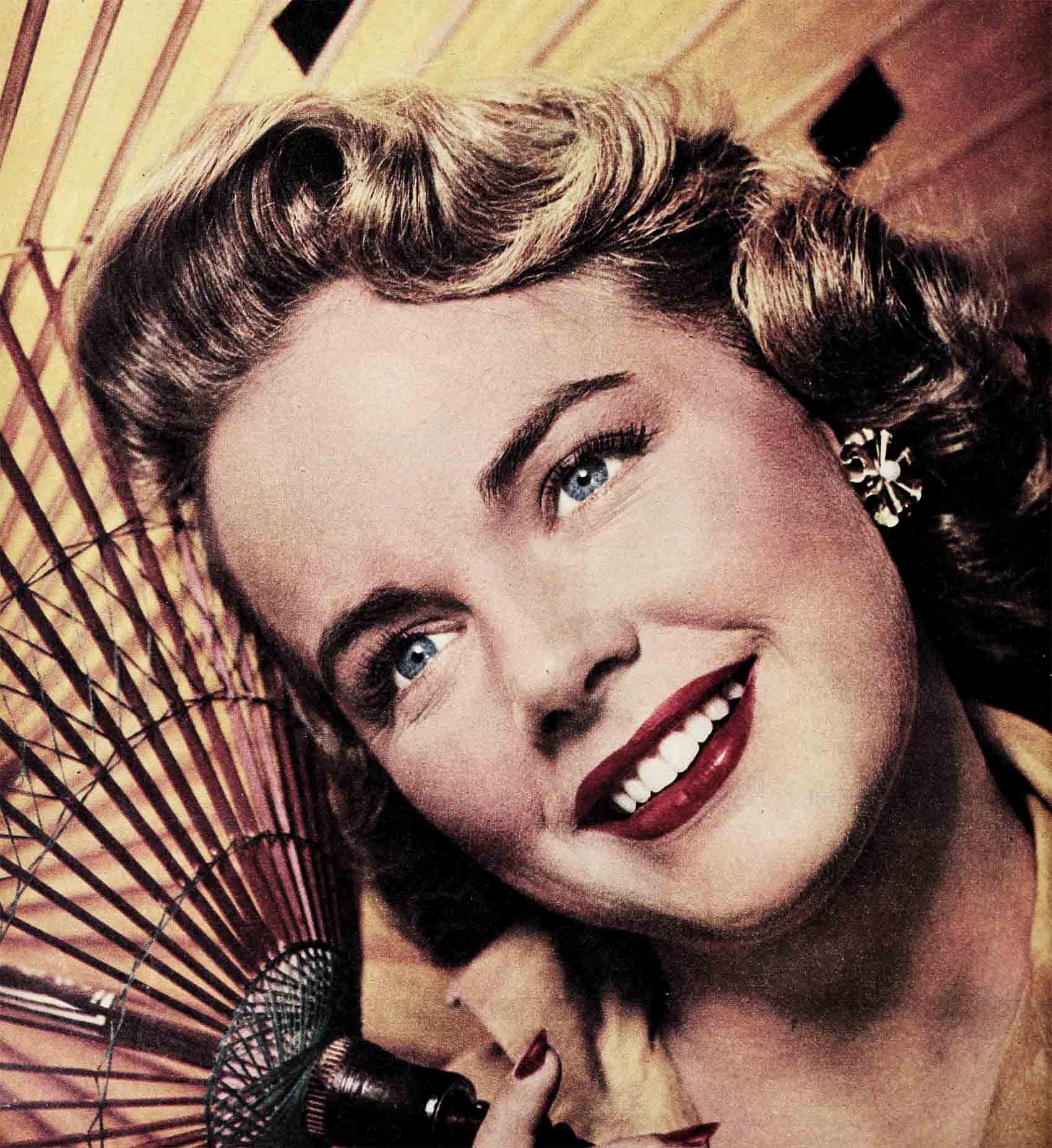
Never begin a diet with the idea that you’re going to have to starve yourself. You don’t have to. If you eat the right foods, you’ll never have to suffer from a gnawing hunger pain. Leave out starchy vegetables like corn, lima beans, peas, rich desserts and sweets that provide little but calories. Never go to extremes either. Remember, the rule is “cut down, not cut out.”
For instance, take that very controversial meal called breakfast . A popular belief is that if you skip breakfast, you’ll begin losing weight right away. So you deprive yourself of your morning meal and then what? You either grab a quick snack later on or find yourself grumpy, tired and irritable and wondering why you’ve no energy.
Breakfast is a very important meal. Your body has gone a long night without food and it’s going to object to waiting until lunch for the first nourishment of the day. The body needs food such as fruit juice, cereal, the protein in eggs as fuel to supply energy. (Just learn to eat your eggs boiled or poached; fry them or scramble them and you more than double the calorie content.) In case you’ve forgotten, the fuel value of food and the body’s energy needs are measured in a heat unit called a calorie. Too many calories, they turn to fat and overweight; too little and the body must use its own fat to make up the difference and you’re underweight. This is why keeping track of calories is important in dieting.
With the help of the calorie table on page 84, you’ll have no difficulty in keeping track of your daily calories. You may even want to clip and post this chart in a prominent place in your bedroom or in the kitchen.
With your calorie count in mind, plan your diet day by day. It’s easier, and the thrill of sticking to it each day seems to make the days go by faster. In planning your daily menus, do make sure that these foods are included in each and every day’s diet: citrus juice or fruit; 1 egg; 1 piece of toast; 1 tsp. of butter or fortified margarine; at least ½ quart of milk; meat or poultry or fish (which may be roasted, steamed, broiled or pan-broiled) or as a substitute for meat, eggs, hard cheeses or cottage cheese; also include one-half cup of fresh fruit, or canned fruit without sugar or unsweetened frozen fruit; a small serving of potato; and as much as you like of plain salad greens, radishes, green peppers, garlic, onion, celery, cucumbers, black unsweetened coffee or tea, or lemonade without sugar. To determine what size proportions to eat, keep in mind the total day’s calorie intake recommended by your doctor, then check the calorie chart to see how many calories are contained in the foods you’ve listed in your menu. Total up all calories and you can see whether you’re staying within limits.
Regular exercising is all a part of reducing—not that exercising will take off weight, but it helps by breaking down solid fat tissue; assists in building up flabby areas. Why not stop by and speak to your doctor or physical education teacher about an exercise program?
You might also be interested in the booklet, “Overweight and Underweight,” which may be secured by writing to the Metropolitan Life Insurance Company, 1 Madison Avenue, New York 10, New York.
Another point you shouldn’t overlook is getting mentally prepared. First, you must promise yourself that once you start you’re going to follow through. To stop and start on a whim never shows results and secretly leaves you displeased with yourself for the lack of will power. Secondly, try to diet with a friend. It’s amazing how much easier it is to pass the drugstore when you have someone with you who’s also on a diet of lemonade, and it’s twice as easy to do exercise when you can share the music and the groans with a dieting chum. Again, exercises should be done regularly. To let the spirit move you only once a week will do no good whatever.
As you can see, I’ve been convinced dieting’s worth all the effort. I hope I’ve convinced you, too. There are over twenty-five million overweight persons in this country. subtract one from the number. Not necessarily for statistics’ sake, but for yourself. Once the deed is done, you’ll have the time of your life.
THE END
It is a quote. PHOTOPLAY MAGAZINE APRIL 1955





No Comments